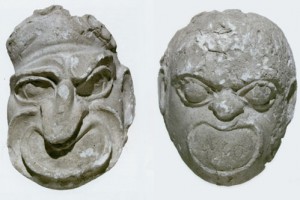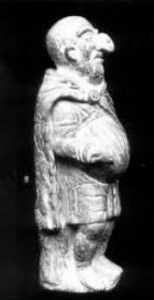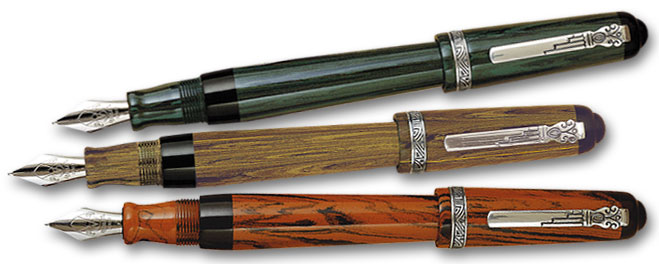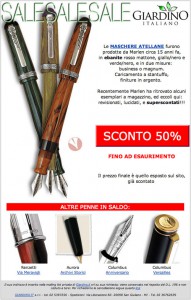 Back in the IV Century B.C.E., Greece was educating its people in democracy and citizenship through Tragedy and Myth in public theaters. At the other end of the Adriatic Sea, Italians preferred laughter to tears and had invented cabaret long before its time: the Atellan Tales. Italian pen maker Marlen has issued a pen series representing the main characters of such ancient tales.
Back in the IV Century B.C.E., Greece was educating its people in democracy and citizenship through Tragedy and Myth in public theaters. At the other end of the Adriatic Sea, Italians preferred laughter to tears and had invented cabaret long before its time: the Atellan Tales. Italian pen maker Marlen has issued a pen series representing the main characters of such ancient tales.
You can now have them at an end-of-series special price from Giardino Italiano.
Democracy and the Empire
Can you imagine a world with no theatre? Back then, the ancient Italians had nothing even close to the Greek’s refinement for the Performing Arts. The Romans’ concept of public entertainment was the ludus, games that involved harsh competition and fighting. Gladiators were part of such games, held as a form of celebration to honor the dead before farewell.
While their neighbors, in Greece, were busy educating a country in philosophy and modernity, the peoples of Italy, under the Romans and local squires, had to struggle with corruption and social abuse on a daily basis.

The performing arts, in Italy, originated stealthily, in country roads. The first records about that dates back to V-IV Century B.C.E., in Southern Italy. Since then, the performing arts would evolve into theatre over a slow process of transformation across the Italian peninsula, until it came to be recognized as a form of Art, as it was in Greece.
The first real brick-and-mortar theatre in Rome was indeed built only in 55 B.C.E. by Gnaeus Pompeius, son of Pompey the Great.
How cabaret was born
If Italy is known worldwide today for the cheerful and welcoming personality of its peoples, that’s mostly due to their history of oppression. Under the invader, one of the safest forms of protest was mockery: coarse laughter, caricatures, peasant costumes and carnivals in a mix of disrespectful rhymes and tunes. All of this was used to reveal the bad of society. This was the harbinger of modern « cabaret ».

The Italian comedy, born as a nomadic form of street art, spread throughout Italy from the South, in the region of nowadays Campania, and precisely from the city of Atella. Among its earliest authors are Gnaeus Naevius and Lucius Pomponius. The most outstanding, however, remains Plautus, the Roman playwright that would become known for the theatrical genre of palliata (Fabula palliata, is the Roman comedy that was a translation or adaptation of Greek New Comedy).
Atellan Tales, an irreverent form of story telling
The Atellan Tales, or « Fabulae Atellanae », are the first form of Italian comedy. Through mockery, they revealed the people’s discomfort towards hypocrisy and conformism in the ruler’s morality. They did so by telling the stories of three main characters, each representing a vice.
Italian pen maker Marlen, who has its headquarters in the town once called Atella, has issued a pen series inspired by the Atellan Tales and their main characters : Maccus, Pappus and Buccus.
Atellan Tales : a unique pen series by Marlen
Atellan Tales is the incredible series of pens issued by Marlen in three versions, corresponding to the main characters of the tales that inspired the original Italian comedy.
All three versions of pens are made from a different ebonite color, with silver trims and steel rhodium nib (Fine, Medium or Bold). Each version comes in Business or Magnum size with piston filler.
Buccus is the red ebonite pen inspired to the « man with a big mouth » : he represents the braggart, the bully and the scrounger that is a parasite to hard-working people.
Maccus, with its green and black ebonite barrel, represents the fool. This is the person who loves to drink and have fun, wheeling and dealing, and, eventually, is a victim of his own foolishness. The name is also the root for « maccherone » (macaroni), that, in Italian, also names a person who is not very astute, and « macchietta », for someone who is awkward and clumsy.
Pappus, which comes with a yellow and black livery, embodies the old, vicious man. This is the libidinous man that is also stingy: in his constant search for money, he is always duped, especially by his own wife. Pappus’ wife was indeed known to cheat on him with young and penniless men for whom she robbed her husband.
.
Baccus, Maccus and Pappus by Marlen are now on special sale from Giardino.it.
Don‘t miss the chance to be inspired by your Atellan Tales’ favorite character to speak your own stories of truth!

